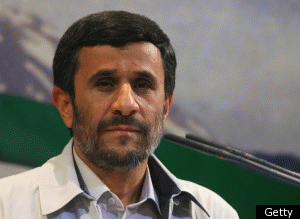With the war there officially "ended" and most of our troops back home, Iraq isn't getting much ink these days. But the story is far from over. Indeed, according to Wadah Khanfar, former director general of Al Jazeera, Iraq is still the most important story in the Middle East -- with a far greater impact on the region's future than Syria. "Nobody's paying attention to Iraq anymore," he told me during dinner in London over the weekend, "but it's becoming a client state of Iran, with a giant amount of oil between them." This state of affairs is, of course, primarily our doing.
And yet, as our soldiers have left, so has our attention. "The war in Iraq will soon belong to history," proclaimed President Obama at Fort Bragg as he marked the occasion of bringing the last troops home. But while the military chapter of that disastrous undertaking might belong to history, its consequences belong very much to the present. A present in which the very same voices that rose to push us into war with Iraq are again rising to push us into war with Iran -- but without ever noting that it was their misadventure in Iraq that gave Iran a new and powerful ally.
"Iraq is not a perfect place," noted the president at Fort Bragg, "but we are leaving behind a sovereign, stable, and self-reliant Iraq, with a representative government that was elected by its people. We are building a new partnership between our nations."
In truth, we've "teamed" with Iran in propping up the Shiite government of Iraqi Prime Minister Nouri al-Maliki -- so stability and self-reliance remain elusive goals for Iraq. And Iraq's closest partnership is no longer with the U.S. but with its Shiite neighbor. The evidence increases by the day.
The Associated Press last week called Iran the "big brother" to Prime Minister al-Maliki's government, noting that Iran "helped create" the al-Maliki administration in 2010 and is now "calling in favors among its allied factions in Iraq" to keep the al-Maliki government from falling in a no-confidence vote. "Iran's fingerprints are all over al-Maliki's inner circle," the AP noted.
It also reported that Shiite clerical leader Muqtada al-Sadr just went to Iran for talks, that Iran is pressuring Iraq's President Jalal Talabani to ease pressure on al-Maliki, and that Shiite cleric Grand Ayatollah Kazim al-Haeri, considered al-Sadr's mentor, recently issued a fatwa against support for secular leaders in Iraq's government. To that end, Iran is also supporting Grand Ayatollah Mahmoud Hashemi Shahroudi to eventually take over for the aging al-Haeri, a move that would "cement Iran's grip on Iraqi affairs."
As the flow of Iraqi oil is increasing, so is the combined power of the two countries. Last week, an Iraqi oil ministry spokesman said that Iran and Iraq plan "to coordinate the two countries' stance at OPEC." And an Iranian state-run TV outlet said the two would adopt "a unified position on OPEC's production." Iran will also be backing Iraq's candidate for the next OPEC secretary-general at the OPEC meeting in Vienna this week.
This makes sense, given the strengthening partnership between Iran and Iraq at the extraction and refinement stages. Right now the two countries share 23 hydrocarbon fields and five major oil fields, and more trade agreements are on the way.
What does it add up to? In April, Iran's first Vice President Mohammed Ridha Rihaimi said that an Iraq and Iran alliance would amount to a "great international power."
He's right. By the end of the year, Iraq will likely pass Iran as the second-largest OPEC producer, and its goal is to more than double oil production by 2015. The combined output of the two countries will soon approach Saudi Arabia's.
I point all this out not to add to the fear-mongering and saber-rattling currently fashionable in D.C., but to highlight the absurdity of rattling those sabers at Iran without acknowledging the role played by our disastrous decade-long war in Iraq -- and the hubris, ignorance and lies that fueled it -- in making Iran more powerful. Every time those voices that helped get us into a war with Iraq beat the drums of war against Iran, they should be asked: what effect has the war you supported in Iraq had on Iran's power in the region? By clamoring for a war in Iraq, was it your plan to empower Iran? If not, and if you were so obviously wrong, then why should we trust you now? What rethinking have you done that would give you credibility this time around?
In February, HuffPost's Michael Calderone wrote a great piece about the dà �ja-vu-all-over-again quality of those currently ratcheting up the tension between the U.S. and Iran:
Military strikes expected! Weapons inspectors called in! A murky al-Qaeda connection! And Cheney says time's up for Ira...Wait. Haven't we seen this movie before?
It's already been a decade since the media hyped bogus WMD claims prior to the U.S. invasion of Iraq. But it sure feels like 2002...
We've still got a war-mongering Cheney, but instead of Dick we've got Liz. "A nuclear weapon in the hands of the world's worst sponsor of terror, one of them, is something we can't stand for," is one of her choice quotes on the subject of Iran.
(Note: You can view every article as one long page if you sign up as an Advocate Member, or higher).





